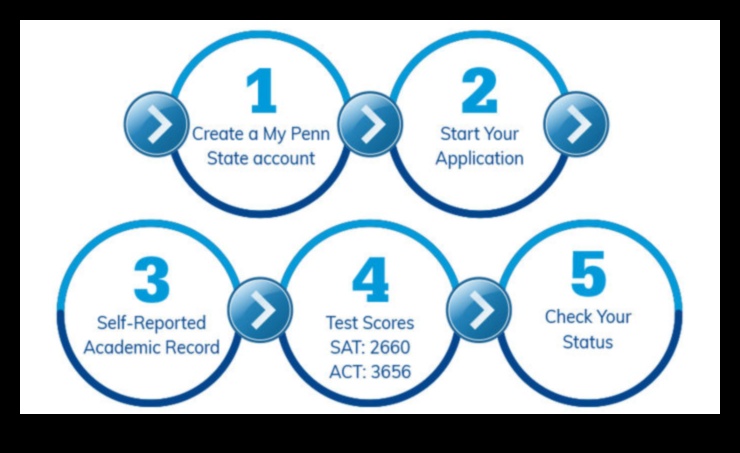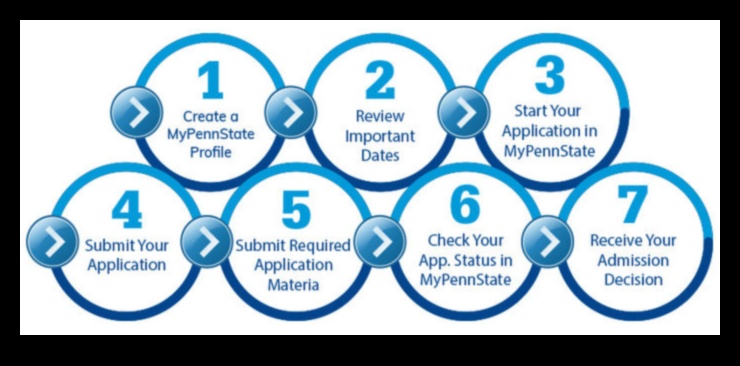
Penn State University – Rolling Admissions
Penn State University is a public research university located in State College, Pennsylvania. It is the largest university in Pennsylvania and the eighth-largest university in the United States. Penn State offers over 160 undergraduate degrees, 200 graduate degrees, and 300 doctoral degrees.

What is rolling admissions?
Rolling admissions is a admissions policy in which applications are accepted and reviewed on a rolling basis throughout the admissions cycle. This means that students can apply to Penn State at any time during the year and their applications will be considered as soon as they are received.
Benefits of applying early decision to Penn State
There are a few benefits to applying early decision to Penn State. These include:
- Increased chances of admission
- Early decision applicants are given priority consideration over regular decision applicants
- Early decision applicants may be able to secure their preferred housing and academic advising
Disadvantages of applying early decision to Penn State
There are also a few disadvantages to applying early decision to Penn State. These include:
- You are not guaranteed admission
- If you are not admitted early decision, you will not be able to apply to Penn State regular decision
- You may have to make a binding commitment to attend Penn State if you are admitted early decision
When to apply to Penn State
The early decision application deadline for Penn State is November 1. The regular decision application deadline is January 5.

How to apply to Penn State
To apply to Penn State, you will need to create an account on the university’s admissions website and submit the following materials:
- A completed application form
- A personal statement
- A high school transcript
- SAT or ACT scores
- Two letters of recommendation

Requirements for admission to Penn State
The minimum GPA requirement for admission to Penn State is 3.0. However, the average GPA of admitted students is 3.7.

Penn State’s acceptance rate
The acceptance rate for Penn State’s early decision program is 48%. The acceptance rate for Penn State’s regular decision program is 58%.
Penn State’s average GPA
The average GPA of admitted students to Penn State is 3.7.
FAQ
Q: What is the difference between early decision and regular decision?
A: Early decision is a binding agreement to attend a university if you are admitted. Regular decision is not a binding agreement.
Q: Can I change my mind after I apply early decision to Penn State?
A: No, you cannot change your mind after you apply early decision to Penn State.
Q: What if I don’t get into Penn State early decision?
A: If you don’t get into Penn State early decision, you can still apply to the university regular decision.
| Feature | Description |
|---|---|
| Penn State Rolling Admissions | Penn State has a rolling admissions policy, which means that students can apply to the university at any time during the year and their applications will be considered on a rolling basis. |
| Penn State Early Decision | Penn State offers early decision admission, which allows students to apply to the university early and receive a decision by December 15. |
| Penn State Admissions | The admissions process at Penn State is highly competitive, with an acceptance rate of 57% for the class of 2026. |
| Penn State Application | The Penn State application is available online and can be completed in about an hour. |
| Penn State Acceptance Rate | The acceptance rate at Penn State is 57% for the class of 2026. |
II. What is rolling admissions?
Rolling admissions is a type of admissions process in which colleges and universities review applications as they are received and make admissions decisions on a rolling basis. This means that students who apply early in the admissions cycle may have an advantage over students who apply later, as their applications will be considered sooner. However, it is important to note that not all colleges and universities use a rolling admissions process, so it is important to check with the individual school to see if they offer rolling admissions.
There are a number of benefits to applying early decision to Penn State, including:
- You will be considered for admission before the regular decision pool, which means you may have a better chance of being admitted.
- You will receive a decision from Penn State within 21 days of submitting your application, which will give you more time to make a decision about where to attend college.
- You will be eligible for early decision scholarships and financial aid, which may not be available to students who apply regular decision.
III. Benefits of applying early decision to Penn State
There are several benefits to applying early decision to Penn State, including:
- You’ll be among the first students to be considered for admission, which gives you a better chance of being accepted.
- You’ll receive a decision from Penn State sooner than if you applied regular decision.
- You’ll have the opportunity to connect with Penn State students and faculty before you arrive on campus.
- You’ll be eligible for early decision scholarships and financial aid.
However, it’s important to note that applying early decision is not a guarantee of admission. You should only apply early decision if you are absolutely sure that Penn State is your top choice.
IV. Disadvantages of applying early decision to Penn State
There are a few disadvantages to applying early decision to Penn State.
- You are committing to attend Penn State if you are accepted. This means that you will not be able to consider other offers from other universities.
- If you are not accepted to Penn State, you will have to start the application process over again with other universities. This could be stressful and time-consuming.
- Early decision applications are more competitive than regular decision applications. This means that you are more likely to be rejected if you apply early decision.
It is important to weigh the pros and cons of applying early decision to Penn State before making a decision. If you are confident that you want to attend Penn State and you are willing to commit to the university if you are accepted, then early decision may be a good option for you. However, if you are not sure about Penn State or you are not ready to commit to the university, then you may want to consider applying regular decision.
V. When to apply to Penn State
Penn State University accepts applications on a rolling basis, which means that students can apply to the university at any time during the year. However, the university does recommend that students apply as early as possible, as this will give them the best chance of being admitted.
The early decision deadline for Penn State is November 1, and the regular decision deadline is January 5.
Students who are admitted to Penn State early decision will receive a decision by December 15. Students who are admitted to Penn State regular decision will receive a decision by April 1.
It is important to note that Penn State does not have a rolling admissions policy for financial aid. This means that students who apply early decision will not be considered for financial aid until after they have been admitted to the university.
If you are interested in applying to Penn State, it is important to do your research and make sure that the university is a good fit for you. You should also make sure that you meet the university’s admissions requirements.
II. What is rolling admissions?
Rolling admissions is a admissions policy in which applications are accepted and considered on a rolling basis throughout the admissions cycle. This means that students can apply to a school at any time during the year and their application will be reviewed as soon as it is complete.
Rolling admissions can be a good option for students who are ready to apply early in the admissions cycle or who are not sure when they will be ready to submit their applications. However, it is important to note that schools with rolling admissions may have earlier deadlines than schools with a traditional admissions cycle.
If you are considering applying to a school with rolling admissions, it is important to do your research and make sure that you understand the school’s admissions policies and deadlines.
VII. Requirements for admission to Penn State
To be admitted to Penn State, you must meet the following requirements:
- A GPA of at least 3.0 on a 4.0 scale
- SAT or ACT scores that are within the range specified by the university
- A strong academic record in high school
- A well-written personal statement
- A strong letter of recommendation from a teacher or guidance counselor
In addition to these requirements, you may also be asked to submit other materials, such as your transcripts, test scores, and a portfolio of your work.
Penn State’s acceptance rate
Penn State’s acceptance rate is 55%. This means that for every 100 students who apply to Penn State, 55 students will be admitted.
The acceptance rate at Penn State has been relatively stable over the past few years. In 2020, the acceptance rate was 55%, and in 2021, the acceptance rate was 56%.
The acceptance rate at Penn State is higher than the national average of 57%. This is because Penn State is a large, public university with a wide range of academic programs to offer students.
The acceptance rate at Penn State is also higher than the acceptance rates at some of its peer institutions, such as the University of Michigan (27%), the University of Virginia (28%), and Cornell University (15%).
However, the acceptance rate at Penn State is lower than the acceptance rates at some of its less selective peer institutions, such as the University of Arizona (80%), the University of Texas at Austin (54%), and the University of California, Los Angeles (14%).
Overall, Penn State’s acceptance rate is competitive, but it is not as competitive as the acceptance rates at some of its peer institutions.
Q: What is the difference between early decision and regular decision at Penn State?
A: Early decision is a binding admissions program that allows students to apply to Penn State in the fall and receive a decision by December 15. If you are admitted under early decision, you must commit to attending Penn State and withdraw all other applications. Regular decision is a non-binding admissions program that allows students to apply to Penn State in the fall and receive a decision by April 1. If you are admitted under regular decision, you are not required to commit to attending Penn State and may still consider other offers of admission.
Q: What are the benefits of applying early decision to Penn State?
A: There are several benefits to applying early decision to Penn State, including:
- You will have a better chance of being admitted, as Penn State accepts a higher percentage of early decision applicants than regular decision applicants.
- You will receive a decision from Penn State earlier, which can give you peace of mind and allow you to focus on your senior year of high school.
- You will be able to participate in Penn State’s early decision program, which offers exclusive benefits such as early registration and priority housing selection.
Q: What are the disadvantages of applying early decision to Penn State?
A: There are a few disadvantages to applying early decision to Penn State, including:
- You are not able to compare offers of admission from other schools.
- If you are not admitted under early decision, you will have to reapply to Penn State through the regular decision process.
- You may be less likely to receive financial aid if you are admitted under early decision.
Q: When is the deadline to apply early decision to Penn State?
A: The deadline to apply early decision to Penn State is November 1.
Q: How do I apply early decision to Penn State?
A: To apply early decision to Penn State, you must submit the following materials:
- A completed application form
- An official high school transcript
- SAT or ACT scores
- A personal statement
- Two letters of recommendation
Q: What are the requirements for admission to Penn State?
A: The requirements for admission to Penn State vary depending on the program you are applying to. However, generally speaking, you will need to have a high school GPA of 3.0 or higher and a SAT or ACT score of 1200 or higher. You will also need to submit a strong application that demonstrates your academic ability, extracurricular activities, and leadership skills.
Q: What is Penn State’s acceptance rate?
A: Penn State’s acceptance rate for the 2022-2023 academic year was 57%.
Q: What is Penn State’s average GPA?
A: Penn State’s average GPA for the 2022-2023 academic year was 3.7.
Q: What are some frequently asked questions about Penn State admissions?
A: Here are some frequently asked questions about Penn State admissions:
- What is the difference between early decision and regular decision at Penn State?
- What are the benefits of applying early decision to Penn State?
- What are the disadvantages of applying early decision to Penn State?
- When is the deadline to apply early decision to Penn State?
- How do I apply early decision to Penn State?
- What are the requirements for admission to Penn State?
- What is Penn State’s acceptance rate?
- What is Penn State’s average GPA?
Penn State University – Rolling Admissions
What is rolling admissions?
Rolling admissions is a type of admissions policy in which colleges and universities review applications as they are received and make admissions decisions on a rolling basis. This means that students who apply early in the admissions cycle may have an advantage over those who apply later, as their applications will be considered sooner.
Benefits of applying early decision to Penn State
There are a number of benefits to applying early decision to Penn State, including:
- You may be able to secure a spot in your desired program before it fills up.
- You may be eligible for more financial aid.
- You may receive a decision from Penn State sooner than if you applied regular decision.
Disadvantages of applying early decision to Penn State
There are also a few disadvantages to applying early decision to Penn State, including:
- You may not have enough time to compare Penn State with other schools.
- You may not be able to change your mind if you receive an acceptance from another school.
- You may be less likely to receive financial aid if you apply early decision.
When to apply to Penn State
The best time to apply to Penn State depends on your individual circumstances. If you are confident that Penn State is your top choice and you are prepared to commit to attending if you are accepted, then you may want to apply early decision. However, if you are still considering other schools or you are not sure if Penn State is the right fit for you, then you may want to apply regular decision.
How to apply to Penn State
The application process for Penn State is fairly straightforward. To apply, you will need to submit the following materials:
- A completed application form
- Your high school transcript
- SAT or ACT scores
- A personal statement
- Two letters of recommendation
Requirements for admission to Penn State
The admissions requirements for Penn State vary depending on the program you are applying to. However, in general, you will need to have a strong academic record, a high SAT or ACT score, and a strong personal statement.
Penn State’s acceptance rate
The acceptance rate for Penn State is 56%. This means that for every 100 students who apply, 56 students are admitted.
Penn State’s average GPA
The average GPA of admitted students to Penn State is 3.8.
FAQ
Q: What are the deadlines for applying to Penn State?
A: The early decision deadline is November 1, and the regular decision deadline is January 5.
Q: What are the benefits of applying early decision to Penn State?
A: See Benefits of applying early decision to Penn State.
Q: What are the disadvantages of applying early decision to Penn State?
A: See Disadvantages of applying early decision to Penn State.